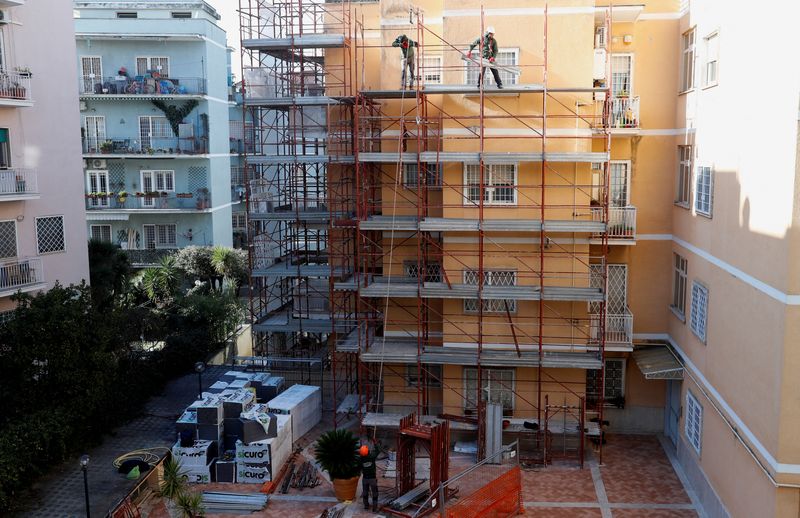By Crispian Balmer and Giuseppe Fonte
ROME (Reuters) - Italy's government said on Tuesday fiscal incentives for home renovations had had a "devastating" impact on public finances over the last four years and were to blame for the expected rise in the country's massive public debt through 2026.
The take-up of the incentives had hit 219 billion euros ($238.1 billion), Economy Minister Giancarlo Giorgetti said.
Successive administrations of all colours have proved incapable of halting the haemorrhaging, despite growing warnings of the escalating problem.
Here is a look at what has gone wrong and why.
WHAT WERE THE SCHEMES?
The most controversial is undoubtedly the so-called Superbonus, introduced by the-then Prime Minister Giuseppe Conte in 2020, which offered to pay homeowners 110% of the cost of energy saving renovations. Another project promised to cover 90% of the cost of doing up the facade of a building.
The government initially predicted the Superbonus would cost 35 billion euros over a 15-year period. After just four years the Treasury says it has already forked out roughly 160 billion euros, an outlay that far outstrips the benefit to the economy.
WHY THE MASSIVE OVERSHOOT?
The government underestimated the scheme's appeal, but also made a number of other errors.
With such generous handouts, homeowners had no reason to haggle with builders over costs. On the contrary, as payments exceeded what they would spend, higher costs meant more money was left for the homeowners.
Asked why they got their forecasts so wrong, officials involved in the budgetary planning have said they had no precedent to draw on as no one outside Italy had ever offered to refund more than the costs of the renovations.
WHY DIDN'T THE GOVERNMENT SEE THE THREAT SOONER?
In May 2022, the then Prime Minister Mario Draghi criticised the Superbonus, saying it helped triple the cost of renovations. But even if officials knew back then they had a problem, they were unprepared for the unfolding financial tsunami.
Besides generous payments, the scheme also allowed to deduct the cost of the building work from their taxes over a 4-10 year period, or use the tax credit as a form of payment when dealing with builders or banks. The buyers could then sell it again, or deduct the sum from their own tax bill.
Officials say they did not have a robust monitoring system in place to track trading in such credits, which became the key driver behind the incentives' ballooning costs by enabling homeowners to commission work without ever having to pay for it.
The government says it also lacked resources to fight fraud. Last August Prime Minister Giorgia Meloni said that 12 billion euros worth of irregular contracts had been uncovered, calling it "the biggest scam" the state had ever suffered. Giorgetti indicated on Tuesday that figure had now risen to 16 billion euros.
WHY NOT END IT SOONER?
Even though Draghi was aware of the risks, his government extended the Superbonus through 2025 under a phase-out arrangement. Meloni, who called it a budget "disaster", imposed limits to who could access it, but did not outright kill it.
The problem is that the programme has become hugely popular with voters and small businesses and none of the political parties would risk pulling the plug, potentially leaving families and builders with worthless credits.
When Giorgetti last month sought to curtail the scheme with a decree that blocked the sales of tax credits stemming from the work, one of the coalition parties, Forza Italia, immediately lobbied to soften the measures. "I fear you do not understand the gravity of the situation," Giorgetti said.
DID IT HELP AT ALL?
The Superbonus helped Italy perform better than any major European economy since the COVID pandemic.
According to Eurostat, construction output in Italy has grown 31% in four years to the end of 2023, while it was down 12% in Spain, down 11% in Germany and was flat in France.
However, economists say Italy would have done better if it invested in health or education as most of the money would then have gone directly into salaries, while contractors incur many production costs and therefore generate less added value.

They also warn that the construction sector could now see a sharp contraction as the scheme nears its end.
($1 = 0.9199 euros)